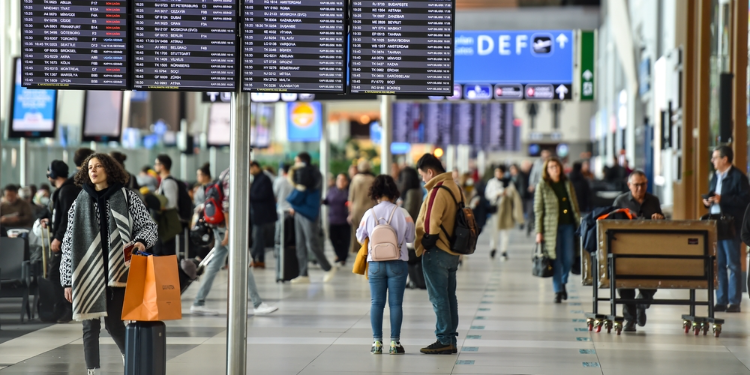According to a study by VisaGuide, London Gatwick Airport is not only the second largest airport in the UK but also the most stressful airport in the world. In fact, half of the world's top ten most stressful airports seem to be in Europe. Let's take a closer look and try to find out why.
What makes an airport stressful?
There are lots of things that can make an airport stressful. But the respondents of the VisaGuide survey helped narrow these down to the following key airport stress factors: a high number of passengers, the large size of the airport that makes it difficult to navigate, crowded airport, the frequency of flight delays, and the distance from the city center.
While many other factors may contribute to high stress levels at airports, most travelers would probably agree that the list above is a good summary.
Based on the factors mentioned, here are the most stressful airports in the world:
First, as we mentioned earlier, we have London Gatwick Airport. While the airport is not the biggest or busiest in the world, travelers seem to be overwhelmed by the large volume of people passing through it, especially during the summer months. The airport also has a high percentage of delays and is quite far from the city center—28 miles (45km).
Next comes Türkiye's Istanbul Airport. It is the busiest airport in Europe and the 7th busiest airport in the world. Travelers complain of trouble navigating the airport, primarily because of its gigantic size: Istanbul Airport covers a whopping 76.5 square kilometers.
Another popular cause of complaints is the high prices. Turkish airports are notoriously expensive. This is true not only of Istanbul Airport but also of smaller local airports. You can easily expect to pay triple the normal price for a coffee and a sandwich across airports in Turkey, and this can be a real nuisance for travelers on long layovers.
As one expat puts it in this airport review video, “you might need a credit card to travel through Dalaman Airport this season”. Dalaman is a smaller local airport in western Türkiye but a frequent connection spot for Istanbul-bound flights.
Delays are another concern
Eugenia was traveling from Germany to Hanoi with her husband and two children and got stranded in Istanbul Airport for over 16 hours due to an unforeseen flight delay. “We travel a lot, and we know that these things happen. But I think a 16-hour delay is quite extreme. Istanbul Airport is huge, and we spent a lot of time looking for a sleeping area, only to find it completely full.”
In third place, there is Munich Airport. The airport sees less than half of Istanbul Airport's traffic, but it's also five times smaller. The most frequently cited issue with the airport is its crowdedness. Munich Airport is a popular connection spot for many international flights, and things get particularly busy during the summer months.
Denver International Airport in the United States is listed fourth. A quick look at TripAdvisor reviews shows that most people have a lot of trouble navigating the airport and don't find the airport personnel helpful.
And in fifth place, we travel back to the UK—more precisely, the hub of British air travel, Heathrow Airport. This is the second busiest airport in Europe, but here's the catch: it's even smaller than Munich Airport. The problem here is obvious: too many people, too little space. The airport stays busy all throughout the year, which makes it a stressful space for travelers.
In sixth place, we have Los Angeles International Airport (USA), followed by Rome–Fiumicino International Airport (Italy), Dallas Fort Worth International Airport (USA), John F. Kennedy International Airport (USA), and O'Hare International Airport (USA).
Customs formalities can be a pain, too
For expats, going through customs and managing arrival formalities can be an additional cause for anxiety. While going through customs is hardly a pleasant experience, relocation adds its own flavor to the already sour mix. On top of ensuring their travel papers are in order, expats often need to deal with other bureaucratic issues, such as ensuring that their belongings comply with import regulations and customs duties, which can vary significantly from their home country.
There are quite a few things that can make a customs check stressful.
The language barrier is the most obvious one. While most big international airports do have English-speaking customs officers, smaller airports may not. So, if anything more complex than a standard document check comes up, expats will need to think on their feet. For instance, expats may be asked to declare certain items, such as electronics and currency, and may face inspections and additional questioning from customs officials.
There is no avoiding the bureaucracy-related stress, too. Expats often need to fill out additional forms or have more than one travel document document. This makes the customs check process longer – and can add to the anxiety of running into complications and missing a flight.
Expats travel to relocate. So they may not have the privilege of traveling light. This could translate into additional security checks, longer wait times, and unforeseen developments. Expats who travel with pets, for example, will have more formalities to deal with.
The best way to prepare for these challenges is to be prepared: read up on related regulations, call the airport for specific information, and seek guidance on what to expect on expat forums.
So, what do you do if you have an upcoming flight at one of the world's most stressful airports?
How to handle airport stress
The easiest thing you could do to avoid airport stress is to not fly in or out of the world's most stressful airports. But that's hardly realistic. Moreover, any airport can turn stressful overnight if you run into a delay. So, are there any effective strategies one could use to manage travel related stress?
The first thing you may need to do is acknowledge that, sometimes, airport stress is inevitable. Fortunately, many airports have now also recognized this fact. The welcome side-effect of this realization is that many airports have started adding serene spaces like yoga and meditation rooms, spa zones, massage salons, and more. For instance, you can now find equipped yoga rooms at San Francisco International Airport. To look for this and similar amenities, consider installing the GateGuru app.
There is more than one way to relieve stress. Sometimes, a light workout may do the trick. Some airports now also include fitness facilities and gyms for those looking to enjoy active wait times. You can now find gyms at Dubai International Airport, Singapore Changi Airport, Zurich Airport, Toronto Pearson International Airport, San Francisco International Airport – and others. The Sanctify app can come in handy here: it makes it easy to find workout spaces in airports.
Yet another way to release travel tension could be hanging with a therapy animal. While this may be a relatively new stress management method, it's already available in a number of airports – including one of the most stressful airports in the world from our list above, Denver International Airport.
If you have some extra money to spend, you can also invest in some extra comfort. Many international airports now feature quiet sleeping and relaxation areas, such as sleeping pods and capsule hotels. For instance, sleeping pods are available at the second most stressful airport - Istanbul International Airport. However, as with most things at Istanbul International Airport, relaxation is also pricey: one hour in the sleeping pod will cost you over €20 per hour.
Another option to consider is private terminals. These are now available at the very stressful London Heathrow Airport and Los Angeles LAX.
And there you have it. Air travel may be stressful – and the typical culprits are crowds, delays, and poor navigation. While there isn't much you can do to control the circumstances of your flight, there are proactive strategies you can explore to keep your nerves at bay. As more and more travel companies become aware of the toll delays and people traffic take on passengers, we may tentatively hope to see organizational improvements and new stress-reducing options.
















